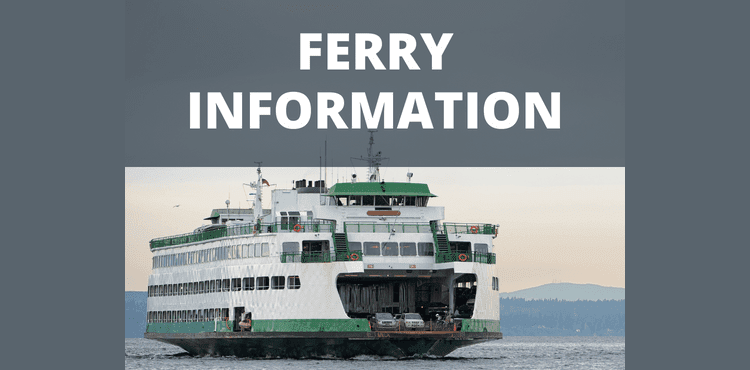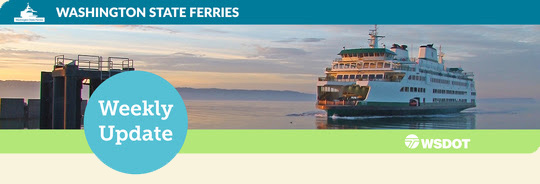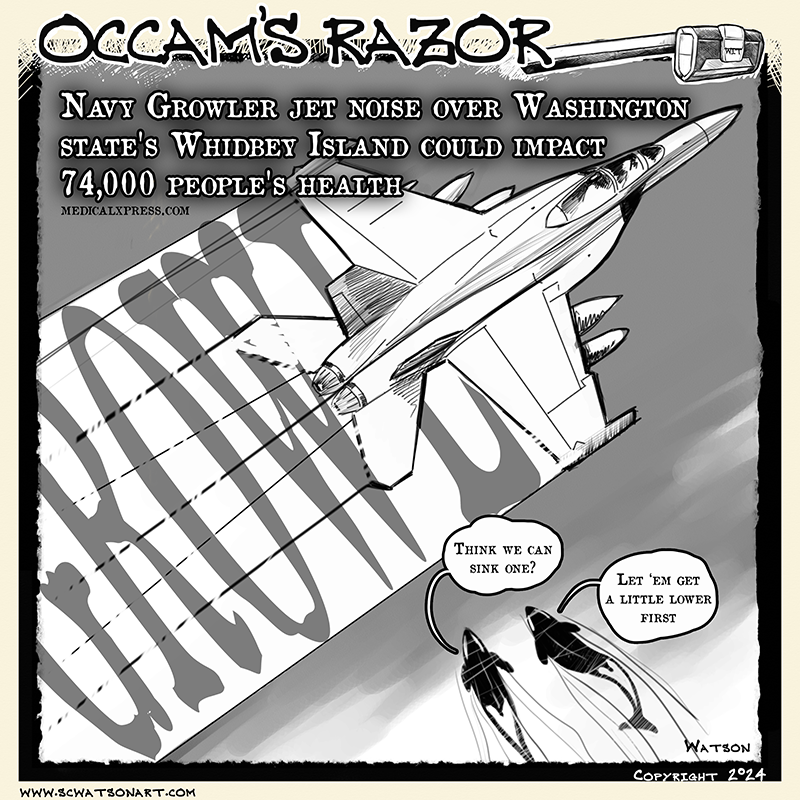||| FROM SAN JUAN COUNTY COMMUNICATIONS |||
This morning, San Juan County Council held a special meeting to discuss the Washington State Ferry (WSF) system. Co-Chairs of the County’s Ferry Advisory Committee (FAC) shared information on three topics: “How did we get here?” “Where do we go from here?” and “What can we do?”
How did we get here?
FAC Co-Chair Jim Corenman explained that the current issues stem from financial and management decisions that were made over the last 20 years. A lack of funding, a shortage of crew, and delays in vessel manufacturing have led to the service disruptions the islands are experiencing.
WSF developed a Long-Range Plan (LRP) in 2019 that calls for 16 new vessels by 2040 to bring the total fleet to 26. However, construction is already five years behind schedule and contracts have yet to be settled. Even when new boats are added to the system, WSF will not be able to increase the overall fleet.
“For every new boat that comes out, an old one will be retired,” explained FAC Co-Chair Ken Burtness. “That will be the case for the first five boats. So, we’re pretty much stuck with a shortage of boats for the foreseeable future.”
In addition, the LRP does not call for an increase in capacity for the San Juan Islands routes. Though projections show an overall increase in ridership demand, the only increase the route will receive is a larger vessel on the interisland run around 2040.
In light of these constraints, San Juan County’s FAC continues to educate WSF officials the ferries on the needs of islanders. This education has paid off and the group has seen success in recently negotiating priority boarding for essential services, commuters, and more.
- The County worked with WSF to ensure 13 trucks could sail to Orcas Island in order to pave Prune Alley on-time.
- Similar negotiations allowed for livestock traveling to and from the San Juan County Fair to receive priority boarding.
- Even school children who commute via ferry are considered when planning around service disruptions.
Where do we go from here?
Burtness and Corenman see hope on the horizon for Washington State Ferries. In the last legislative session, funds were allocated to support a year-round workforce and increased training opportunities. Many hope this pledge to provide stable, year-round work will help increase worker retention and encourage growth within the system.
“Since last fall, WSF has hired 130 people as full-time employees,” said an optimistic Burtness. “But it takes a long time for those people to move up into higher level positions. It’s a process that does not happen overnight.”
Recently, the San Juan Islands routes were prioritized at number one in the Ferry Service Restoration Plan and were returned to full service before any other route in the system. Several other routes continue to run on a limited schedule while the islands’ service has been fully restored.
“Washington State Ferries understands that the system is your highway,” said John Vezina, the Director of Planning, Customer, and Government Relations at Washington State Ferries. “That’s why the islands have been given priority scheduling.”
San Juan County Councilmembers are in regular contact with WSF as well as federal and state legislators. Since 2014, the ferry system has been a part of the County’s annually adopted legislative agenda. Last year, council requested $1.2 million in local emergency relief funds from the state legislature to accommodate interruptions to needed medical services, inter-island transportation, and vital goods and services. Funding would support:
- A barge contract to transport large vehicle deliveries should the island experience a 50% reduction in scheduled sailings.
- Reimbursable costs including accommodations, air transportation and/or road transportation for those with critical medical appointments
- An on-call charter vessel that could be used to transport students, employees, jurors, or other residents back to their home island if inter-island service is cancelled.
Councilmembers have also worked with Representative Rick Larsen (WA-02) to advocate for federal funding for the ferry system. Recent efforts have resulted in funding for the Lopez Terminal among other system-wide improvements.
“In San Juan County, ferries are a necessity, not a luxury,” said Larsen, a senior member of the Transportation and Infrastructure Committee. “The Bipartisan Infrastructure Law and the state’s Move Ahead Washington package invest in ferry infrastructure and workforce development to keep people and the economy moving while reducing carbon emissions.”
What can we do?
During Thursday’s special meeting, Councilmember Cindy Wolf spoke to the issue of dependability and the need for reliable routes.
How do we partner in good faith with an organization that is not evaluating the situation?” Wolf asked. Corenman answered, “The only way to make service dependable is to have spare resources.”
Because WSF is limited by their crew and number of vessels, the group discussed the option of reducing service as a means to create spare resources for the system. By reducing the number of runs and amount of crew hours, the San Juan Islands routes may experience more reliable sailings – though this method was not recommended by the FAC.
“So, if the number one goal is dependability, then you’ve got to come up with a way to have spare people and spare boats. And that is to reduce service. There are only two pieces to that equation,” said Corenman. Reduced service may include re-writing the schedule or operating on a “disruption schedule” for prolonged periods of time.
In addition to exploring reduced service options, council continues to advocate for island residents by working alongside 40th district legislators. Members of the public looking to get involved in ferry advocacy are invited to attend upcoming Ferry Advisory Committee Outreach Sessions this October (the 15th and 18th) as well as write to representatives of Washington’s 40th legislative district:
- Senator Liz Lovelett leads the legislative ferry caucus – an informal group of representatives from ferry-served communities in the state.
213 John A. Cherberg Building, PO Box 40440, Olympia, WA 98504
Phone: (360) 786-7678; Email via online form here
- Representative Debra Lekanoff
422 John L. O’Brien Building, PO Box 40600, Olympia, WA 98504
(360) 786-7800; Email via online form here
- Representative Alex Ramel
132D Legislative Building, PO Box 40600, Olympia, WA 98504
(360) 786-7970; Email via online form here









This is a selective account of what went on in today”s council meeting, obviously intended to put the council in a good light. Much of what is reported in the second section above was not mentioned in the meeting but obviously added by the council or staff. What I heard repeatedly from Corenman and Burtness is that the WSF system has been operating on the hairy edge of inoperability, with only a single crew-member absence or a ferry taken out of service for repairs leading to across-the-board cancellations and chaos for the rest of the day. As Jim said, and was quoted correctly above, we need spare people and spare boats to give the system the flexibility to deal with the unexpected—which should be expected by good managers.
I wonder who will rise to meet this entrepreneurial opportunity? It seems WA State I has not been as proactive over the past twenty years as they needed to be to prevent the broken-down system we have in 2022.
Yes, tax dollars feed the transportation system and fares keep going up and up.
Perhaps a passenger-only coop -option, with cars stationed on the mainland and a lease agreement with the State to use the ferry docks, could offer alternatives and relief?
Zip Car or Car-to-Go (preferably electric- Hey, OPALCO!) located at the ferry lots could reduce the clogs in this system?
I hear that this will be expensive, prohibitive, etc… AND, the prognosis, as offered today in this Special Meeting, doesn’t seem to uplifting…so, what possible?
The following link will take you to a report: https://app.leg.wa.gov/ReportsToTheLegislature/Home/GetPDF?fileName=210127-pof-study-report-only_01801813-952b-431d-80b5-675299c10de3.pdf
PUGET SOUND PASSENGER- ONLY FERRY
STUDY
January 2021
Page 59 details findings in a Bellingham-Friday Harbor/Orcas route.
It is unclear if this study has been followed up with any additional work.
The estimate is for 21,000 rides per year, at an annual cost over $2,000,000!!
One of the issues raised at yesterday’s meeting was the fact that certain crew were in Anacortes while the ferry was at one of the islands needing a crew change or vice-versa. It seems that WSF or the County needs emergency transportation through contract or ownership to transport crew between the mainland and islands via air or another fast boat rather than waiting hours for the ferry to return.
I would grade the County Council session a D++. They got the most of the contract problems with the new ferry construction well explained. They supposedly gave a last 20 years history on how we got to this point … ignoring the 2009 Long Range Plan which explained the WSF financial recovery plan from the voters approving I-747, the Washington Supreme Court overturning that vote in 2007, and the State Legislators approving the MVET reduction ands recovery plan (primarily the abnormally high fare increases and a significant share of state gasoline taxes earmarked for WSF). No mention that 5 new ferries were planned to be built 2010-2014. Bingo … that happened, although one new class ferry has had some significant gear problems. The only planned ferry that didn’t get done in that plants 2010-2019 ten year span was the Hyak, and the state decided it wasn’t wise to spend the $20+ million on that rehab. That reduced the number of available ferries from 22 to 21 … essentially leaving no spare ferry for the normal summer of 19 ferries since two are normally in a shipyard. The 2009 Long Range Plan also had 5 new ferries the first coming on line in 2027 … much the same as the 2040 Long Range Plan, which was primarily done to revise the vessel build plan for the decision to move to electrification of vessels.
Both FAC presenters blame lack of WSF funding and personnel shortages for our present 40% on time reliability (which is why the ferry users are upset and wasn’t on the CC agenda to discuss … not sure who made up the agenda). But neither lack of funding or personnel shortages appear to be the real reason for such dismal on time performance the WSF system is experiencing. WSF’s has spent millions on terminal upgrades, has built all the new ferries laid out in the 2009 Long Range Plan (Hyak rehab cancellation the one exception), and has left appropriated money on the table most of those years … not large amounts, but essentially they haven’t fully spent what they have had available, but I caution with that statement, because of contract timing that frequently happens.
Because of COVID, loss of ferry personnel who retired or refused to be vaccinated during a world pandemic, WSF did have a ferry crew problem. So … they reduced the number of summer ferries from 19 to 15 … that’s a simple 79% of normal summer vessel runs. September’s 2022 ferry crew staffing numbers were 1,050 personnel, and their target crew staffing is 1,133 … 92.7% of the personnel WSF says they need to run 19 operating vessels are currently on board.
Are they really short crew members when they are only operating 15 vessels? Are the FAC members correct in saying this is a personnel shortage situation for WSF’s? Or might the current ferries cancelled because of lack of crew be something wrong in the way crews are scheduled and apparently so many are calling about their crew assignments and needing replacements? September’s WSF monthly report stated WSF dispatchers are having to make “dozens of calls” each day to find crew replacements. I don’t buy it’s a long standing crew shortage issue, and there certainly isn’t a lack of vessel issue when they are only running 15 ferries in the summer.
Writing to key legislators and the Washington State Transportation Commission and repeated explaining that ferries are San Juan Counties bridges and providing real stories of ferry delays, wait time, costs, economic impact, etc, is proper advice. FAC presenters and CC got that part right.
It’s pretty simple to express that what San Juan County wants and needs are realistic schedules, a reservation system that works, and 90% on time performance, since there are always going to be some valid reason for delays.
The most disturbing item in this article, mentioned almost as an afterthought, is that WSF’s Long Range Plan “does not call for an increase in capacity for the San Juan Islands routes.” So, all the talk about new boats coming online is of no use to us here. Think getting a ferry reservation is difficult now? Add just 2% annual growth in demand over the course of the next 25 years–which comes to almost two-thirds more traffic–which is expected to be accommodated with NO CHANGE to capacity!
A “Long Range Plan?” What are these people thinking?
Thanks, Robert, for filling in some of the blanks left by the Council report above.
Gretchen, I’m a big fan of the concept of walk-on ferries. Here are a few to inspire – there are a number of electric, some are solar powered, and would be best for use in sunny months. These would be helpful for tourists too, reducing drive-on traffic. Would also like to see local electric public transportation, to help folks that don’t want to own a car and pay the insurance.
https://www.youtube.com/watch?v=Vj9TX5eZHAo&themeRefresh=1
https://www.popularmechanics.com/technology/infrastructure/a41390878/high-speed-electric-passenger-ferry/
Our elected government officials need to change any existing laws to give Island residents priority in travel.
This is our highway, we pay for it.
The rest can be fixed in time.
Jay,
The idea of walk on ferries seem illogical to me unless they go from other than the WSF terminals at Anacortes, Lopez, and Orcas (Shaw doesn’t have a business district). Why? Because none of those terminals are in the business district areas. And I don’t think walk ons are the issue … what WSF;’s is trying to do is eliminate vehicles.
Would you propose running them to downtown Anacortes, Lopez Village, and Eastsound?
WSF has a consultant working on shifting more San Juan traffic to walk ons … well, you would need other public transportation systems to be constructed to even get to the business areas. I think that study is going to be a waste of money, but then again, many, if not most consultant reports just end up on a shelf collecting dust anyway.
And I don’t think existing ferries ever have had a maximum passenger load here in the San Juans … correct me if I’m wrong. Only the Bainbridge and Bremerton routes have ever reached max passenger capacity as I can recall … and those were Super Bowl parade and Seahawks playoff game day ferries.
Tourists almost certainly are going to use a passenger ferry unless it”s for a one day visit to an island. Those that travel for shopping aren’t going to use a walk on ferry if they buy at COSTCO or get products at at Home Depot. (Only using them as examples).
The one plus for walk on ferries MIGHT be service to some non-ferry serviced islands, but they have very low populations, so that’s an economics problem, and I’m not sure those residents would even want public transportation to their islands.
The ferry system’s two biggest problems stem from decisions in Olympia.
After the Hyak sea trials in 1967, the ferry director contacted National Steel and Shipbuilding in San Diego to comment that Hyak had exceeded all requirements and that they would be ordering more than the remaining three ‘Supers’ (Kaleetan, Elwha and Yakima). However, NASSCO had just received a Navy contract for a major supply ship, and was anticipated to being awarded the contract for the Newport Class LST. It is difficult to raise any argument that the San Diego Supers have been the best ferries ever in the system. Nonetheless, political pressure resulted in Washington State enacting RCW 47.60.814, requiring all ferries to be built in Washington. Since only one shipyard is capable of building the ferries, there has been no competitive bidding since 2001. How can anyone expect to build affordable ferries without competitive bidding?
The second bad decision was the Executive Order by Governor Inslee requiring all State employees to get the Covid vaccination or lose their jobs. How an EO could override civil service protections and union agreements has been beyond me, but the end result was a loss in ferry system employees, including scores holding Coast Guard licenses, that has been at the core of staff shortages since.
Hyak was retired in 2019 and Elwha in 2020. Yakima and Kaleetan continue in service. The subsequent Navy ships built by NASSCO, including 17 Newport Class LSTs, were all decommissioned by 2002. Yakima and Kaleetan each cost $6.5M and have 55 years of service. We will never be that lucky again.
The above comment is very instructive, especially about the functionally no-bid contract law. It also made me wonder what $6.5 million in 1967 dollars (the reported purchase price of the Yakima) would be today. I found this calculator online; presuming it’s accurate, $6,500,000 in 1967 equals $55,082,462.01 in 2022.
https://www.saving.org/inflation/inflation.php?amount=6,500,000&year=1967